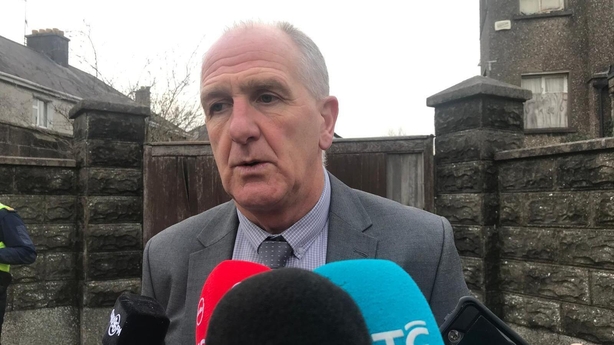The Minister for Justice has said a working group to accelerate garda recruitment is due to report in the coming weeks.
Helen McEntee said there needed to be “a radical change” in the way gardaí are recruited in order to bring the numbers up to over 15,000.
The group she said was examining how to potentially change the process “to suit the way people are living, working and studying now”.
The Garda Commissioner said a number of options are being considered, including new satellite training colleges in addition to the college at Templemore in Co Tipperary.
Drew Harris also said they were looking at directly recruiting into An Garda Síochána, specialists in areas like cyber and economic crime.
The working group is due to present Ms McEntee with a range of options in the coming weeks and she said today she will then “act” on those.
Senior gardaí criticise new ‘idealistic’ policing model
Senior Garda officers have strongly criticised the new Operating Policing Model which is being introduced by Mr Harris.
They say it has led to them losing their links with local communities and the staff they supervise.
Garda Superintendents have also called for an increase in the number of gardaí appointed to the rank and have described the current limiting economic framework as inadequate, unsatisfactory and unacceptable.
The Association of Garda Superintendents is holding its annual conference in Co Meath and is due to be addressed by Commissioner Harris and Minister for Justice Helen McEntee.
Garda superintendents are the senior operational leaders and decision makers on the ground in An Garda Síochána.
They say they have in the last year faced and policed many difficult situations, including the riots in Dublin city centre and in Coolock, which illustrate the challenges in modern-day policing and the ever-increasing demands being placed on them.
The superintendents’ association said that while dealing with new processes, new structures, new responsibilities and additional demands, they still face the same problems and are expected to “make do with what they have”.
They say the problems they continue to face include insufficient resources, inadequate accommodation and operating within unworkable geographical configurations.
They are particularly critical of the new Operating Policing Model introduced by Commissioner Harris.
They describe it as “idealistic” and “rushed or forced through without consideration” of the impact on the people tasked to deliver it, and more importantly on the communities gardaí serve.
Garda Headquarters said the Operating Policing Model has been developed based on feedback from the organisation and has been introduced in 16 of the 21 garda divisions.
It said it reflects international best practice as well as the realities of modern-day policing in Ireland, the changing nature of crime and is designed to modernise organisational structures that have been in place for over 100 years.
Losing links to local communities
President of the Association of Garda Superintendents Detective Superintendent Colm Murphy said that because of the Operating Policing Model Divisions, they are losing the links with local communities and with their personnel.
The association cites the Clare/Tipperary Division as an example of an area that is too large and with limited resources.
Previously there were four superintendents in Co Clare, it said, but under the new policing model there is now just one, based in Ennis. The previous superintendents were also based in Killaloe, Ennistymon and Kilrush.
The association said there is only one detective superintendent in that division now with responsibility for all serious crime from Loop Head on the Atlantic coast to the Tipperary border with Kilkenny.
It also said the detective superintendent for Cork county’s area of responsibility stretches from Youghal to the Beara Peninsula and up to Mitchelstown, Charleville and Millstreet.

The association has also called for the Economic Control Framework, which limits the number of Superintendents to 168, to be increased.
It said this limit is “wholly inadequate, unsatisfactory and unacceptable” and has placed significant pressures and “an increased burden” on them because of additional demands, expectations and responsibilities.
These include having to police an increased number of protests, high-profile sporting events, concerts, public order policing, extraordinary events, Operating Policing Model realignment and the deployment of Garda Superintendents as Regional Garda Liaison Officers abroad.
General Secretary Michael Comyns said they are seeking an increase of at least 20 superintendents as they are needed to adequately police the country.
He also said the current limit of 168 is purely for financial reasons as part of an economic framework but that there is a statutory provision “a ranks order” that allows for up to 191 Superintendents to be appointed.
Garda Headquarters said that the number of garda numbers at each rank is subject to the Employment Control Framework but promotions continue to be made. For example, in August 2024 there were three promotions to Superintendent rank.
